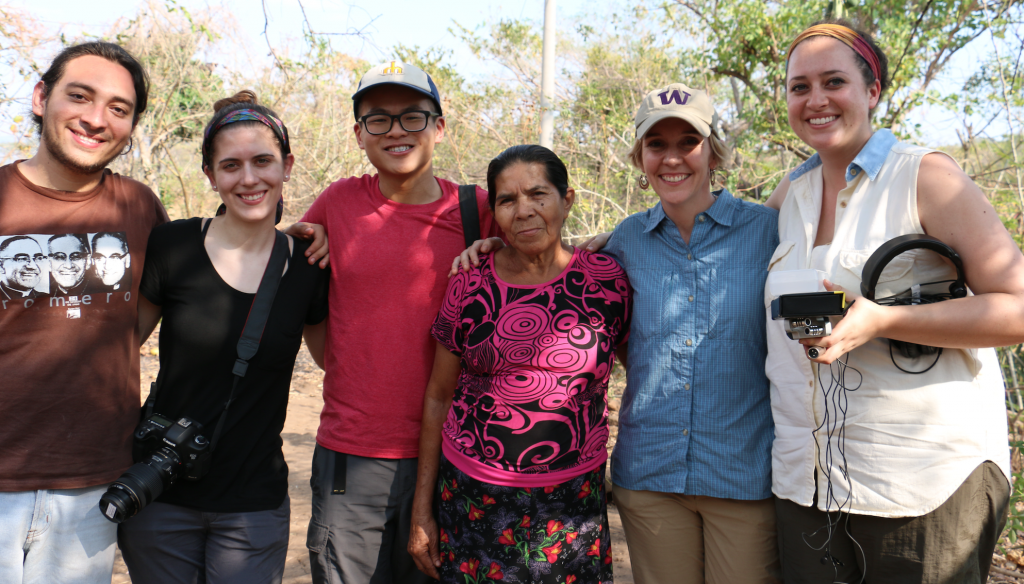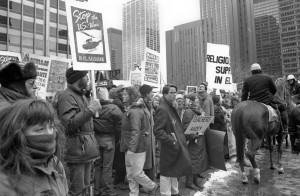Human Rights Column Justice in El Salvador
Salvadoran survivors of state terror—crimes for which no one has been held accountable—have created an organization that helps families uncover the truth of what happened to their lost loved ones. This is no small task. But given the intense U.S. involvement in El Salvador, some of the information they seek may be available in the musty archives of our own government. The University of Washington Center for Human Rights partners with human rights organizations seeking truth, justice, and reparations.

Members of the University of Washington faculty and student team in El Salvador, with Pro-Búsqueda staff and Milagro Martínez (at center). February 2015
It’s been almost 25 years since the conclusion of the armed conflict in El Salvador, not that you’d guess it from talking to a woman like Milagro Martínez, whose children were forcibly disappeared in the 1981 massacre of La Quesera. When my students and I visited her in her home last February, the immediacy of her pain was apparent. Amidst the chaos of a military invasion that October day, she told us, her children were wrenched from her arms. Some children taken by the military at La Quesera were seen being thrown out of helicopters; others survived, and some were given in adoption to Salvadoran and foreign families. In an effort to find out what happened to their missing children, Doña Milagro and other Salvadoran survivors of state terror have created an organization called Asociación Pro-Búsqueda that seeks to help families uncover the truth of what happened to their lost loved ones.
This is no small task. In 1993, the UN Truth Commission for El Salvador concluded that over 75,000 civilians had been killed in the years from 1980-1992, over 85% at the hands of state forces and paramilitary death squads. Yet still today, no one has been held accountable for these crimes in El Salvador. Many families still lack the most basic information about the fate of their loved ones. And without knowing when, why, or where their loved ones fell, many have never been able to fully grieve their passing, let alone pursue justice or achieve closure.
Over 75,000 civilians had been killed in the years from 1980-1992, over 85% at the hands of state forces and paramilitary death squads.
And yet, here in the United States, some of the information they seek may be available in the musty archives of our own government. At the University of Washington Center for Human Rights, we have been working since 2011 in partnership with Salvadoran human rights organizations seeking truth, justice, and reparations for crimes from the conflict era. As academic researchers, it is our task to produce and disseminate knowledge that can assist in Salvadoran-led efforts. Towards that end, our team has documented survivor testimony, strengthened grassroots memory efforts in communities affected by scorched earth, and filed over 200 Freedom of Information Act (FOIA) requests of US government agencies in an effort to clarify specific cases.

Protest against US involvement in the Salvadoran Civil War in Chicago, Illinois, in March 1989. Photo Linda Hess Miller. CC BY 3.0.
In many cases, these FOIA requests have led to the release of information that victims and advocates have told us makes a difference in their decades long quest for knowledge. In the massacre of La Quesera, for example, our research uncovered new evidence that US officials witnessed some of the killings from a helicopter; we are now seeking the declassification of further documents, hoping that some might contain information useful to Doña Milagro and others like her in their search.
In other cases, however, US government agencies have been less cooperative. As part of our research into a different 1981 massacre, we requested information from the CIA pertaining to the officer whose troops carried out the killing. The CIA alleged that merely acknowledging the existence of documents, let alone releasing them to us, would endanger US national security. Yet our own researchers uncovered 20 already-declassified documents pertaining to this perpetrator, one of them posted on the CIA’s own website. The fact that the CIA failed to, at minimum, provide us copies of these documents already in the public domain showed they were failing to comply with the law. We filed suit in October 2015, becoming the first university to challenge the CIA in court under FOIA; the suit is still pending.
Two months ago, we heard wonderful news from El Salvador. Asociación Pro-Búsqueda located Milagro’s son Nicolás in Australia, and DNA confirmed the match. Now a grown man with children of his own, he returned to El Salvador to be reunited with his birth family. The entire community gathered to join Milagro in her joy at embracing her son for the first time in 35 years. In the photographs, her smile is radiant.
Her daughter Marisol remains missing.
President Obama has announced his intention to declassify records relating to the dirty war in Argentina—an immensely positive step for human rights.
Just weeks ago, President Obama announced his intention to declassify records relating to the dirty war in Argentina, an immensely positive step for human rights. Yet because the US government was much more intimately involved in El Salvador, US records contain even richer detail about daily operations there, including much that could be useful in the search for the disappeared. For Doña Milagro and the thousands of other Salvadorans who still search for a lost loved one, a similar initiative should be undertaken to declassify US documents relating to El Salvador.
Our country continues to fuel overseas conflicts without pausing to examine the legacies of past engagements.
No less important, we should also do this for us. In the wake of the Snowden revelations, awareness has spread about the need for greater transparency, yet our country continues to fuel overseas conflicts without pausing to examine the legacies of past engagements. A decade ago, Donald Rumsfeld went so far as to invoke the “Salvador option” as a possible blueprint for Iraq. Today, Elliott Abrams – the same man who covered up abuses in El Salvador – is a foreign policy advisor to presidential candidate Ted Cruz. Ignorance is dangerous. As researchers and as teachers, we believe uncovering the truth about El Salvador can help heal past wounds and aid in the prevention of future ones.
Angelina Snodgrass Godoy is the Helen H. Jackson Chair in Human Rights and Director of the University of Washington’s Center for Human Rights.














